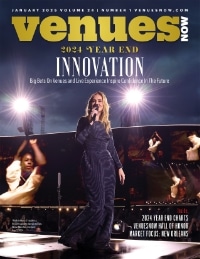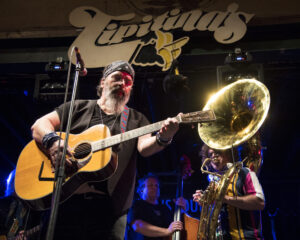PHILLY FRIENDS: Larry Rubin, left, pictured with Ike Richman and another Philly sports fixture, Charlie Abel, blended creativity and a unique sense of humor. (Courtesy Ike Richman)
“Put something where it doesn’t belong. It’s as simple as that.”
Larry Rubin, longtime public relations maven at the Spectrum and Spectacor Management Group, died on April 28. Ike Richman, president of Ike Richman Communications, who was mentored by Rubin and who’s become one of the top event and venue marketing professionals in his own right, shared this tribute to Rubin.
Larry Rubin’s creativity, blended with his unique sense of humor, set him apart from all other PR professionals. His ability to conceptualize and execute a publicity stunt — whether it’s Michu, the world’s smallest man, floating into Philly amongst the tall ships or taking a chimpanzee to a daycare center to celebrate its birthday, both to promote the circus — are legendary and would make PT Barnum envious.
After a lengthy battle, Rubin passed away on Thursday, April 28, two weeks after turning 81, in only the way he could.
He spent his last days talking to friends, colleagues, and family and sharing stories, correcting a few falsehoods. His daughter, Leslie Rubin Cohen, invited anyone who worked or knew her father to share a story on her Facebook page. And she and her mother, Flora, read them to Larry while he smiled, laughed, blushed, and, at times, shed a tear. The messages and stories are countless because Larry, the former PR maven at the Spectrum in Philadelphia (1976 – 1986) and the vice president of corporate communications for Spectacor Management Group, touched the lives of thousands, and his work, mainly behind the scenes, impacted millions around the world.

Larry was a terrific mentor who took me as a young gun, molded me and turned me into a PR professional.
His stories are legendary in the arena business.
In December of 1976, as The J Geils Band was rehearsing on stage for a performance at the Spectrum that evening, Rubin encountered a young man observing the rehearsal from the Spectrum press box. He politely told the young man, ‘you can’t be out here at this time, and you will have to leave.’ When Rubin said that the young man he removed was observing The J Geils Band for ideas as he would soon be performing on that same Spectrum stage shortly, Rubin ran after Bruce Springsteen, apologizing to him and welcoming him back to the press box.
Rubin was also involved in many historical events and had to make quick media decisions on whether the event should proceed or not.
The first was in December 1980, the night John Lennon was shot. That night Bruce Springsteen was scheduled to play at the Spectrum, and the decision was to keep the show going on but not to inform Springsteen of the incident until after the performance.
The second was in 1981 at the NCAA final four. That day Ronald Reagan, President of the United States, was shot, and Larry went up and down press row asking what people thought, “should the game go on or not?” Rubin quickly went to the NCAA and said the consensus is the United States needs this game to be played so that we all can rally together.
A conversation with Larry was always inspiring, insightful, and encouraging. He knew everyone and made everyone feel special. His early advice to me was, “Don’t worry about what you know or don’t know. Instead, treat people the way they want to be treated, and make sure you give them everything they need.”
He taught me “create publicity stunts by putting something where it doesn’t belong. It’s as simple as that.” Like when we walked show dogs from Ringling Bros. and Barnum & Bailey down Jewelers Row in Philadelphia to shop for dog tags or when we put a reporter in the Globe of Death. Larry always had a vision for what would make the news.
I often find myself asking, “what would Larry do?” and I will continue to be inspired by his imaginative approaches, creativity, and sense of humor.
From April 1992 until January 1993, I reported directly to Larry but had the honor and privilege of working together on many projects long after. I couldn’t wait to sit next to him at any of our Philadelphia Public Relations Association events, and when he called to tell me I was being inducted into the PPRA Hall of Fame, I said, “Only if you induct me.”
Before his time at the Spectrum, Rubin worked as a public information officer for the police department in Philadelphia, at the office of city representatives for the city of Philadelphia, and the Evening and Sunday Bulletin as a reporter.
Most recently, Larry assisted the Police Foundation helping them tell amazing stories of their impact on first responder families who lost a loved one in the line of fire.
Larry’s proudest accomplishments are his marriage of 56 years to his beautiful wife, Flora, their two children Leslie (Jeff) Rubin Cohen and Stephen, and their two lovely granddaughters, Emily and Danielle Cohen.
Larry said in our last conversation on Saturday, “I wish we could still work together.” I said, “We will always work together. Everything I do, I learned from you. I am proud to carry on your legacy.”
I’m glad I got to tell him one more time on Saturday, “I love you, Larry. You’re the BEST!”
Rubin was born on April 11, 1941, to Jules and Freda Rubin. He graduated Northeast High School in January 1959, and Temple University with a BS in Political Science.
Donations may be sent to Lankenau Hospital (Philadelphia) in honor of Dr. Bruce Kornberg who was his doctor, friend, camper at overnight camp and lifesaver for 37 years, or the Philadelphia Police Foundation.








